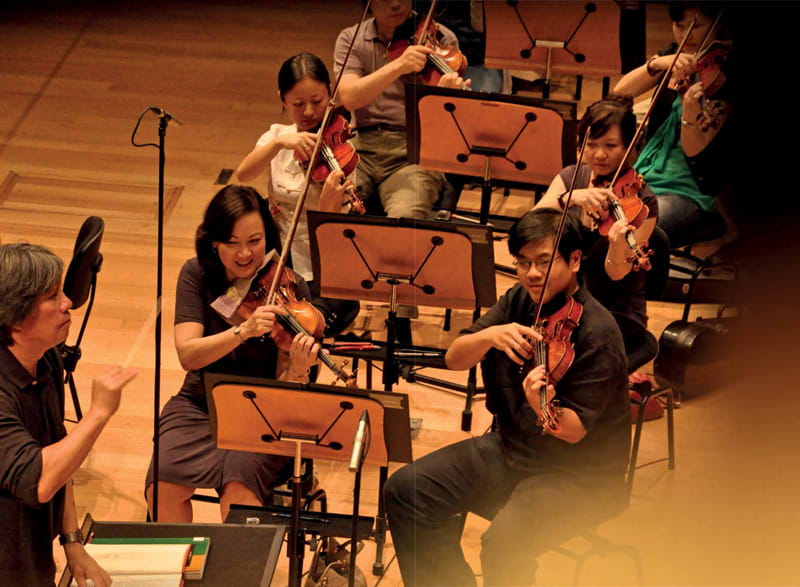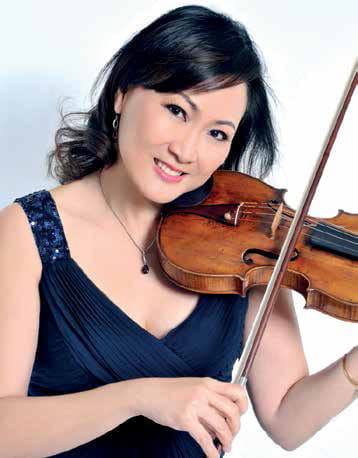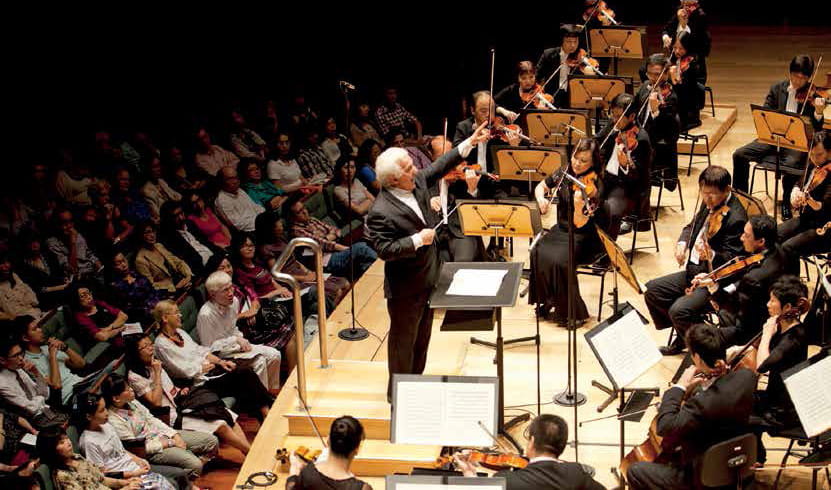Stories > Tugging At hard Strings
Tugging At hard Strings


Lynnette Seah (seated to the right of former resident conductor, Lim Yau) and the SSO rehearse at the Esplanade. Joined by a combined choir, the SSO enjoyed a standing ovation for its Carmina Burana concert in 2012

Lynnette Seah, a founding member of the Singapore Symphony Orchestra, is a stalwart of classical music in the Republic. The accomplished violinist speaks her mind about budding musicians and their future.
By Lai Ee Na
ynnette Seah, co-leader of the Singapore Symphony Orchestra (SSO) and Cultural Medallion recipient, is not one to mince her words about classical music in Singapore. Fiercely self-disciplined, she expects the same commitment in her students and readily calls out on against the standard of instructors in commercial music schools.
“The most important thing is that my students are passionate about learning to play the violin. Playing the violin needs real passion,” she says.
“If you don’t have that, it’s never going to get anywhere. If you don’t enjoy it, how can the listener enjoy it?”
Seah, 57, advises parents of budding musicians to make an effort to look for a good teacher who can stoke the passion and keep it burning even when the learning gets tough and demanding. Greatly sought after herself, Seah says qualified teachers can be found in the many good musicians within the SSO and at some music schools.
“Some commercial schools just get teachers who might not be good players themselves, but can teach well. To gauge the quality of teaching, it’s best to have one-to-one lessons because every child has different capabilities and speeds of learning. Some students come to me with wrong techniques and that is hard to correct, especially when they get older. I am a firm believer that a child should learn how to read music from young, unlike some modern music-teaching methods. It’s important that a child learns to read and play music at the same time.”
Seah was first trained by her mother and concert pianist, Lau Biau Chin. When Seah was five, Lau had instilled in her the discipline to practice the piano every day. When Seah was six, she started learning the violin.
As a student of the Methodist Girls’ School and Anglo-Chinese Junior College, Seah liked mathematics and science and wanted to be a doctor like her father. However, her wish to complete her A-level education was not to be. She won a scholarship to study music at the Hannover Hochschule, one of Germany’s largest music academies, for two years after she represented Singapore at the Southeast Asian Violin Competition.
“It wasn’t a choice for me. My mother thought it was best for me to go immediately,” Seah explains.
“The most important thing is that my students are passionate about learning to play the violin. Playing the violin needs real passion. If you don’t have that, it’s never going to get anywhere.”
She was 16 when she went to Germany. “My first European winter was very depressing. I threw myself into practising eight hours a day; from 8.30am to 6pm, in a small practice room. It had a piano and a small window. I looked out at the park from the window, and imagined playing music to the people out there.
“That was a major turning point in my life because of the loneliness. The diligence and lonely commitment to practising gave me a good grounding. My professor was pleased with my progress.”
She carried her strong work ethic back to Singapore, where she joined the SSO in 1979 as a founding member and acting leader.
These days, her schedule is packed with four rehearsals a week (from 9.30am to 1.15pm) for every SSO programme. She performs on Saturdays and occasionally on Sundays at the Esplanade. On her own, Seah practises for two to three hours a day on her 1750 Gabrielli violin in her Tiong Bahru flat that she shares with her younger son, Andre.
She has been coaching the first violinists of the Singapore National Youth Orchestra for the last few years; she herself joined the orchestra when she was 15.
Continued growth of this orchestra has been on her mind. “With the Music Elective Programme in schools, I’d encourage all secondary schools to have their own little orchestras. Then the students will find out whether they are good at it and probably learn outside and be a feeder to the Youth Orchestra.”
She advises young musicians to have a good grounding before going overseas to get exposure to all the orchestras, and their soloists, of the city.
In the last few years in Singapore, new classical ensembles of students and professional musicians have been emerging. The Orchestra of the Music Makers, comprising music students, is an example and it was the resident orchestra at two key British music festivals in 2012. Another is the Metropolitan Festival Orchestra set up by Spain-based cellist Ng Yu Ting in 2013, which brings together Singapore musicians. Seah welcomes their growth.
“All the orchestras are important for Singapore to inculcate in the younger generation the love of classical music and being part of a symphony. I think classical music is composed in heaven and will last for eternity.”
“All the orchestras are important for Singapore to inculcate in the younger generation the love of classical music and being part of a symphony. I think classical music is composed in heaven and will last for eternity. It’s not like pop culture that comes and goes,” she says.
She however concedes that music-making is easier for the love of it and not for a living. Many orchestras in the world are losing their funding, she notes.
“When there’s an opening in the orchestra, there will be hundreds of people queuing for it,” she explains. “I would encourage players to keep practising and to play as much as you can, be it any chamber concert or recital, even if they can’t get a full-time job in an orchestra.”
Meanwhile, one dilemma is that Singaporean musicians who are based overseas prefer not to return, she adds. “Singapore still has the old British colonial mentality that foreign musicians are better. To be a local musician working here is a very tough journey,” she reveals.
However, she explains that she returned because she wanted to be part of the national symphony growth.

Lynette Seah concedes that music-making is easier for the love of it and not for a living.
Clearly Seah has achieved this and more. On Sept 2 this year, the orchestra will perform at the BBC Proms at the Royal Albert Hall in London. The Proms—short for Promenade concerts—is a two-month musical festival organised by the BBC.
“SSO has become a world-class orchestra and Singapore can be proud of it,” Seah says with a smile.
Between rehearsals, Seah trains her five private students in the rigours of violin playing. One of them, Kayli Choo, occupies a special place in her heart.
“I have a seven-year-old girl who is a prodigy—I finally got one! She’s a joy and blessing to teach,” Seah says with a smile.
Choo had gone to Seah when she was five, having started music lessons in a commercial school when she was just 41/2. “She has great concentration, perfect pitch, great sense of rhythm, the IQ and the EQ for understanding and feeling the music. God has given her to me by some miracle,” says Seah.
She hopes the talented girl will eventually take over her place in the SSO. “Because then I would have left behind a good legacy,” she explains. “She can sit through two-hour concerts. She hardly makes more than two mistakes per piece. She has the drive for perfection, which is necessary for playing the classical violin.”
Kayli can certainly look to the virtuoso as a living example of hard work paying off.
“I always give 150% in every rehearsal and every performance, regardless of how
many we have in the audience.”

Vladimir Ashkenazy conducts the SSO for the first time during its 2011 gala concert at the Esplanade.
“I always give 150% in every rehearsal and every performance, regardless of how many we have in the audience,” Seah says. “Before I start the first note, I block out the audience and the musicians behind me. I get into the zone until the last note dies. Then I can relax.”
Seah has no lack of appreciative aficionados. After a concert in Ostrova in the Czech Republic, an elderly lady presented Seah with a flower and said she loved her playing. “That was a true reward for my sacrifice and years of practice,” recalls Seah.
In Sweden, after she played a Mozart violin concert with the Orebro Chamber Orchestra, her professor came backstage and gave her a hug and a kiss on the cheek. “He stroked my cheek and said: ‘That was so good.’ His daughter gave me a bouquet of flowers too. These are moments I will always treasure.”
Yet, as with any driven musician, she would sometimes think the performance could have been better. “There’s never a perfect performance. You just have to take it for what it is.”
Concert-goers in Singapore seem to think otherwise. Attendance at SSO concerts has been at least 80% on average with regulars filling seats, Seah reveals.
SSO plays about 50 concerts a year. The Esplanade has been the orchestra’s main performance venue, but it will play again at its refurbished home, the Victoria Concert Hall (VCH), after it re-opens in August.
Seah looks forward to returning to the Hall. In celebration of the re-opening, SSO will play Joseph Haydn’s Sinfonia Concertante for violin, cello, oboe and bassoon. “I am excited about that because I am the last surviving founding member of the SSO,” she explains with a smile.
She also plans to record her second album in VCH, having released 1,000 copies of her first album in 2011 called Lynnette Seah: A Musical Odyssey. She reveals that the playlist will include “more chunky pieces”.
“I want to record in VCH because I’ve spent my entire life there,” she explains. “It’s for me to leave something behind for the young to listen to.”
In addition, Seah is setting her sights on playing more chamber music at the VCH with the Jade String Quartet that she started years ago. Performing with the quartet had been put on hold because of the first CD project and heavy rehearsal schedules. Having lived and breathed classical music all her life, Seah is quick to speak her mind against unfair criticism.
According to the January/February 2013 issue of music magazine Fanfare, a certain violinist, in an interview in the New York Times Magazine years ago, said Orientals could never become the next wave of violinists, following the great Slavic one he was in. The reason, he said, is that “they didn’t have souls”.
Seah retorts: “Many Asians are winning international competitions because Asians are more sensitive, more physically nimble and more disciplined.”
She pointed to Yo-Yo Ma as an example. “When he plays, you can cry listening to him, because his soul is very deep. A person’s soul development doesn’t equate to what nationality he comes from or what race. It is whether the person has sensitivity and EQ to give to his instrument, to his listener.”
While she clearly regards classical music very highly, she loves jazz as well. She recalls jamming years ago with an old junior college schoolmate, Don Gomes, now a jazz pianist and singer based in Perth, Australia.
“He was trying to get me into the flow. It was so much fun to do something different. I was reading the music from a saxophone book. I enjoyed it. It was very good,” Seah reminisces.
She says, tongue firmly in cheek: “It’s harder for me to break free from rigid training. Maybe I can play jazz after three glasses of wine?”
Gomes is all praise for Seah. “She’s an accomplished individual. She has a natural, good sense of music. If you’re a good musician, you are a good musician.”
He recounts the time they first met when they were both in secondary school and played pop songs of the day, including the Carpenters, in a band.
“We were pretty terrible. She’d be singing and playing a little bit of the piano. She had a sweet 15-year-old voice,” he says with a laugh.
Beyond music, Seah flexes her creative muscle in cooking. Not just any home cooking, but serving well-plated courses worthy of a trained chef at Italian restaurant Rubato in 2011, for instance.
Ian Low, writing in his blog The Silver Chef, describes Seah’s stint as guest chef in glowing terms: “Being a virtuoso in the music field, Lynnette has also proven her calibre in the annals of cuisine as well with this excellent menu and night of cooking.”
Seah used to help her mother in the kitchen. When she was 11, she started cooking for her family.
“I like having a combination of flavours and colours so that the food will jump out visually and taste-wise. … Even in a stage presentation, how you stand is all part of the package. So this is just an extension of my creative side,” she explains, having learnt to help her mother in the kitchen since young, and actually cooking for her family by the time she was 11 years old.
Seah’s SSO friends get to enjoy her culinary talent at dinner parties, which she hosts once or twice a month.
Chan Yoong-Han, 39, fixed chair first violinist, was one fortunate guest. “It is always a pleasure to be invited to her home dinners, and I especially love her Peranakan cooking, roast beef and tiramisu,” he says.
Seah’s friends have been asking her to open a restaurant. She said: “I am waiting for someone to open a restaurant for me. Then I can create what I want.”
This would be another tasty treat for her fans.
Noteworthy Odyssey |
|
| 1969: |
Won a scholarship to the National Music Camp at Interlochen, Michigan, in the United States. |
| 1972: |
Appointed as associate leader of the Bishop Symphony Orchestra at the Australia National Music Camp in Adelaide; represented Singapore in the South-east Asian Violin Competition; won a scholarship to study at the Hannover Hochschule for Music in Germany for two years. |
| 1978: |
Joined Singapore Symphony Orchestra (SSO) as founding member and acting leader. |
| 1995: |
Performed at the Bergen International Music Festival in Norway. |
| 1996: |
Represented Singapore in the World Philharmonic Orchestra as the Assistant Concertmaster, under the baton of Myung Whun Chung to mark the 50th anniversary of the King of Thailand’s ascension to the throne. |
| 1997: |
Conferred the Excellence Award by the Composers and Authors Society of Singapore. |
| 2005: |
Served as a member of the National Arts Council’s National Piano and Violin Competition advisory committee; was a member of the Ministry of Education’s Arts Education Committee, which oversees arts institutions such as the Nanyang Academy of Fine Arts, the Yong Siew Toh Conservatory and LASALLE-SIA College of the Arts. |
| 2006: |
Awarded the Cultural Medallion for music; represented Singapore in the World Philharmonic Orchestra in Paris; performed at the world premiere of Singapore composer Bernard Tan’s Violin Concerto—dedicated to Seah—at the SSO 27th Anniversary Concert. |
| 2007: |
Was guest leader for the Macau Symphony in their 2007 China concert tour |
| 2011: |
Released her debut CD, Lynnette Seah: A Musical Odyssey |
| 2014: |
Inducted into the Singapore Women’s Hall of Fame |
| Sources: National Arts Council, Niven • Niven, The Straits Times | |
